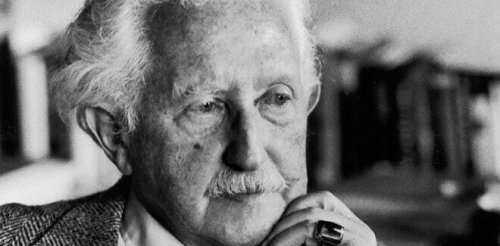Seven Famous Erik Erikson Quotes


Reviewed and approved by the psychologist Sergio De Dios González
Erik Erikson worked as a teacher until he met Anna Freud. The daughter of the famous psychoanalyst inspired him to start studying at the Vienna Psychoanalytic Society, specializing in child psychoanalysis.
Some of his most important work was his theory of psychosocial development based on Sigmund Freud’s stages of psychosexual development. That’s why he is also known as “the Freudian psychologist.”
We won’t be discussing that particular aspect of his work in this article, but we will be exploring some Erik Erikson quotes that deserve to be read.
The research that Erikson did throughout his career had a significant impact on the world of psychology. These quotes that we’re going to share today are a reflection of his passion for his work as a teacher and child psychoanalyst and the way he saw the world. Let’s read and reflect on these ideas.
1. Inherited fears
“Healthy children will not fear life if their elders have enough integrity not to fear death.”
This famous Erik Erikson quote mentions a subject that profoundly affects all of us: fear. Just as a parent’s choice of school will have positive or negative repercussions for their children, so will the parent’s fears affect their children, at least to some extent.
That’s why it’s so important for parents to face their fears instead of trying to cover them up. The last thing any parent wants is to pass their fears and misgivings along to their kids. Especially because children are ill-equipped to deal with fear in a healthy way.

2. Accept your victories and defeats
“A child becomes an adult when he realizes he has a right not only to be right but also to be wrong.”
Here, Erikson is teaching the reader the important lesson of knowing how to lose and how to win. As you get older, you realize that when you win, those around you praise and flatter you. However, when you lose they turn their backs on you or even say “I told you so.”
This happens to a lot of children when they can’t pass a subject without help, for example, or when they aren’t skilled at their parent’s favorite sport. Knowing how to be kind to yourself and not being too critical are traits of more stable and centered adults.
3. Parents responsibility
“It’s a long haul bringing up our children to be good; you have to keep doing that – bring them up- and that means bringing things up with them: Asking, telling, sounding them out, sounding off yourself – finding, through experience, your own words, your own way of putting them together. You have to learn where you stand, and make sure your kids learn [where you stand], understand why, and soon, you hope, they’ll be standing there beside you, with you.”
Our third quote talks about a fundamental part of raising children, which is the responsibility of their education. A proper education requires care, attention, and presence. You have to be there to play and experience life with them.
Absent parents don’t teach their children anything, and it’s much more difficult for them to ask things of their children. If you don’t spend time with your kids, they won’t internalize the lessons you’d like to teach them. Words mean nothing if they aren’t accompanied by actions. Children need their parent’s presence in their lives more than anything.

4. Everything changes
“You’ve got to learn to accept the law of life, and face the fact that we disintigrate slowly.”
You never stop growing, and things are constantly in flux. As you age and pass through different stages of development, you face different challenges. Sometimes one stage abruptly ends before you are ready, and forces you to change. This means that you have to constantly reinvent yourself.
Many of us are afraid of change, but the truth is that change allows you to grow. Sure, we’re all heading in the same direction (towards “disintegration,” as Erikson says) but along the way you grow and change and have new experiences.
5. Destructive and empty praise
“Children cannot be fooled by empty praise and condescending encouragement. They may have to accept artificial bolstering of their self-esteem in lieu of something better, but what I call their accruing ego identity gains real strength only from wholehearted and consistent recognition of real accomplishment, that is, achievement that has meaning in their culture.”
Our fifth famous Erik Erikson quote talks about the superficial way that we often speak to children. You say “good job” automatically and so often that it loses its meaning. The problem with this kind of praise is that it’s far too general. A child could do almost anything to win that kind of praise.
The other problem is that receiving praise becomes the child’s motivation. Instead of doing something because they enjoy it, or because they want to do well, they do it to hear adults say “good job.”
Later in life, they’ll expect that kind of praise in other contexts – at work, with friends, or at school. When they don’t get the praise they want, they end up feeling frustrated. Praise isn’t bad, but Erikson believed that adults should use it in moderation.
6. The freedom of young people
“Adolescents need freedom to choose, but not so much freedom that they cannot, in fact, choose.”
This quote highlights the common tension that parents experience when raising teenagers. While it’s true that limits and boundaries are crucial for raising healthy adolescents, they also need to feel free to make their own choices sometimes.
Erikson suggests that we need to find a balance between boundaries and freedom. After all, extremes are usually bad, and too much freedom can lead to very bad decision-making.

7. Sense of identity
“In the social jungle of human existence, there is no feeling of being alive without a sense of identity.”
Our last Erik Erikson quote touches on the idea that your identity is being shaped from the time you’re little. Insecurity, then, makes you feel lost (something you’ve probably experienced at some point in your life). According to psychologist Miguel Molla, young people who feel insecure about their identities are more vulnerable or prone to addiction.
Erik Erikson continued to write and do research even after his retirement. That just goes to show you how passionate he felt about his work. His commitment to his vocation shines through in the quotes we shared today. Each one has something to teach us about life and about who we are. Which one speaks to you the most?
Erik Erikson worked as a teacher until he met Anna Freud. The daughter of the famous psychoanalyst inspired him to start studying at the Vienna Psychoanalytic Society, specializing in child psychoanalysis.
Some of his most important work was his theory of psychosocial development based on Sigmund Freud’s stages of psychosexual development. That’s why he is also known as “the Freudian psychologist.”
We won’t be discussing that particular aspect of his work in this article, but we will be exploring some Erik Erikson quotes that deserve to be read.
The research that Erikson did throughout his career had a significant impact on the world of psychology. These quotes that we’re going to share today are a reflection of his passion for his work as a teacher and child psychoanalyst and the way he saw the world. Let’s read and reflect on these ideas.
1. Inherited fears
“Healthy children will not fear life if their elders have enough integrity not to fear death.”
This famous Erik Erikson quote mentions a subject that profoundly affects all of us: fear. Just as a parent’s choice of school will have positive or negative repercussions for their children, so will the parent’s fears affect their children, at least to some extent.
That’s why it’s so important for parents to face their fears instead of trying to cover them up. The last thing any parent wants is to pass their fears and misgivings along to their kids. Especially because children are ill-equipped to deal with fear in a healthy way.

2. Accept your victories and defeats
“A child becomes an adult when he realizes he has a right not only to be right but also to be wrong.”
Here, Erikson is teaching the reader the important lesson of knowing how to lose and how to win. As you get older, you realize that when you win, those around you praise and flatter you. However, when you lose they turn their backs on you or even say “I told you so.”
This happens to a lot of children when they can’t pass a subject without help, for example, or when they aren’t skilled at their parent’s favorite sport. Knowing how to be kind to yourself and not being too critical are traits of more stable and centered adults.
3. Parents responsibility
“It’s a long haul bringing up our children to be good; you have to keep doing that – bring them up- and that means bringing things up with them: Asking, telling, sounding them out, sounding off yourself – finding, through experience, your own words, your own way of putting them together. You have to learn where you stand, and make sure your kids learn [where you stand], understand why, and soon, you hope, they’ll be standing there beside you, with you.”
Our third quote talks about a fundamental part of raising children, which is the responsibility of their education. A proper education requires care, attention, and presence. You have to be there to play and experience life with them.
Absent parents don’t teach their children anything, and it’s much more difficult for them to ask things of their children. If you don’t spend time with your kids, they won’t internalize the lessons you’d like to teach them. Words mean nothing if they aren’t accompanied by actions. Children need their parent’s presence in their lives more than anything.

4. Everything changes
“You’ve got to learn to accept the law of life, and face the fact that we disintigrate slowly.”
You never stop growing, and things are constantly in flux. As you age and pass through different stages of development, you face different challenges. Sometimes one stage abruptly ends before you are ready, and forces you to change. This means that you have to constantly reinvent yourself.
Many of us are afraid of change, but the truth is that change allows you to grow. Sure, we’re all heading in the same direction (towards “disintegration,” as Erikson says) but along the way you grow and change and have new experiences.
5. Destructive and empty praise
“Children cannot be fooled by empty praise and condescending encouragement. They may have to accept artificial bolstering of their self-esteem in lieu of something better, but what I call their accruing ego identity gains real strength only from wholehearted and consistent recognition of real accomplishment, that is, achievement that has meaning in their culture.”
Our fifth famous Erik Erikson quote talks about the superficial way that we often speak to children. You say “good job” automatically and so often that it loses its meaning. The problem with this kind of praise is that it’s far too general. A child could do almost anything to win that kind of praise.
The other problem is that receiving praise becomes the child’s motivation. Instead of doing something because they enjoy it, or because they want to do well, they do it to hear adults say “good job.”
Later in life, they’ll expect that kind of praise in other contexts – at work, with friends, or at school. When they don’t get the praise they want, they end up feeling frustrated. Praise isn’t bad, but Erikson believed that adults should use it in moderation.
6. The freedom of young people
“Adolescents need freedom to choose, but not so much freedom that they cannot, in fact, choose.”
This quote highlights the common tension that parents experience when raising teenagers. While it’s true that limits and boundaries are crucial for raising healthy adolescents, they also need to feel free to make their own choices sometimes.
Erikson suggests that we need to find a balance between boundaries and freedom. After all, extremes are usually bad, and too much freedom can lead to very bad decision-making.

7. Sense of identity
“In the social jungle of human existence, there is no feeling of being alive without a sense of identity.”
Our last Erik Erikson quote touches on the idea that your identity is being shaped from the time you’re little. Insecurity, then, makes you feel lost (something you’ve probably experienced at some point in your life). According to psychologist Miguel Molla, young people who feel insecure about their identities are more vulnerable or prone to addiction.
Erik Erikson continued to write and do research even after his retirement. That just goes to show you how passionate he felt about his work. His commitment to his vocation shines through in the quotes we shared today. Each one has something to teach us about life and about who we are. Which one speaks to you the most?
This text is provided for informational purposes only and does not replace consultation with a professional. If in doubt, consult your specialist.







